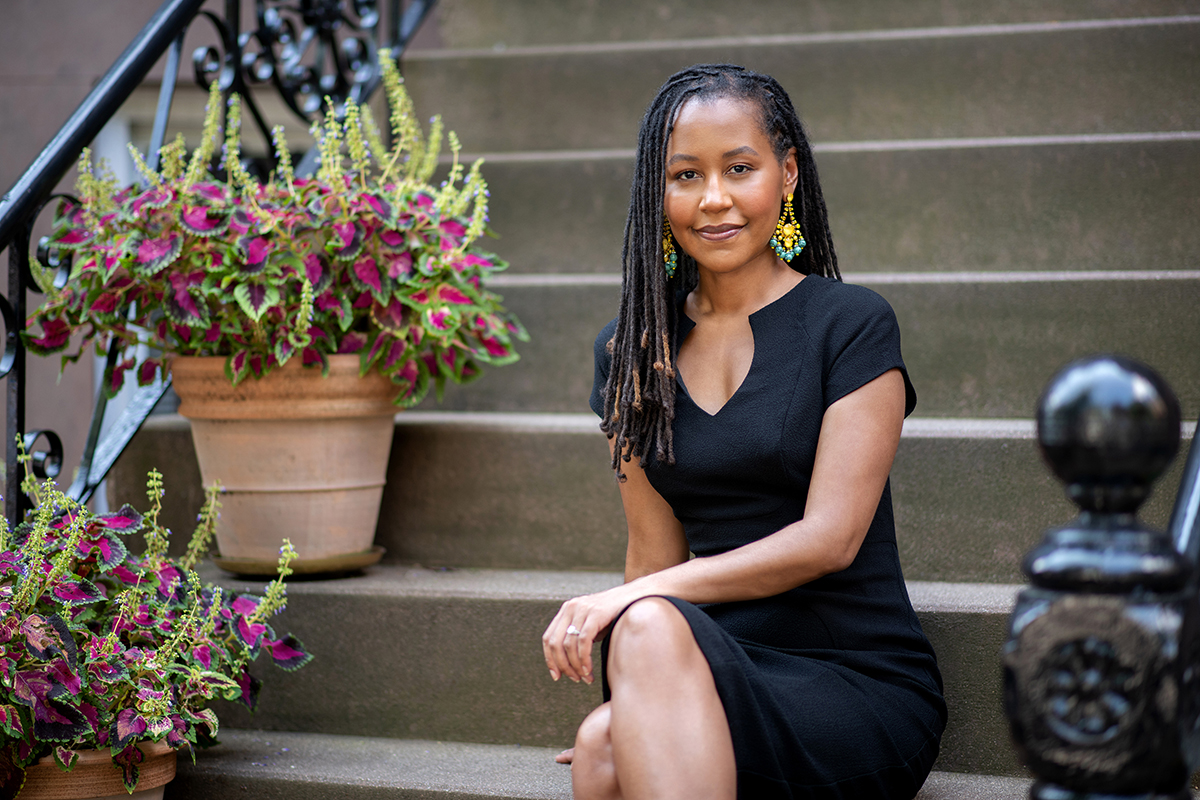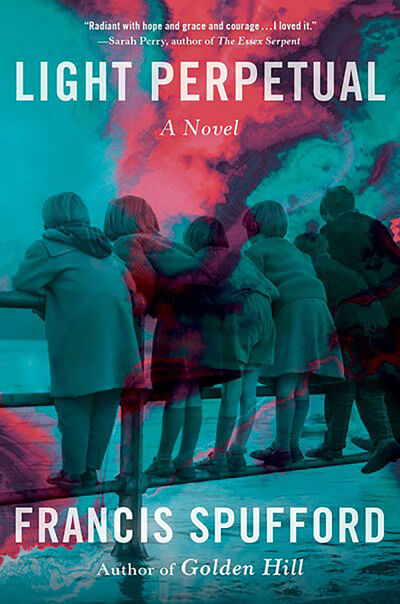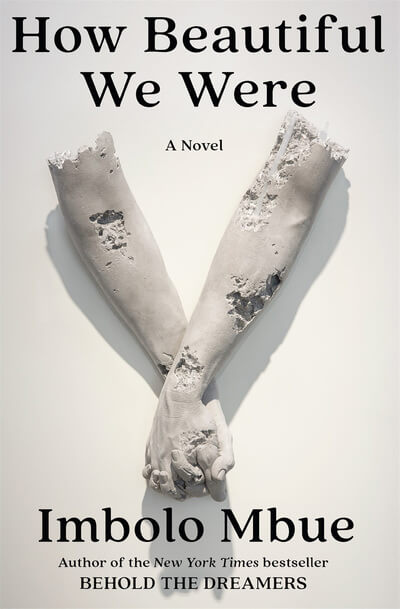Dawnie Walton’s The Final Revival of Opal & Nev is a brilliant fictional oral history that explores music, race and the cultural ties that bind us together. As a music journalist with experience at Essence, Entertainment Weekly, Getty Images and LIFE, Walton brings behind-the-scenes insight to the story of a 1970s rock ’n’ roll duo and the reasons they vanished from the spotlight. Here she discusses the legacy of Black women in rock and the strange ways that music moves us.
Music is notoriously difficult to write about. Was creating these characters and their art daunting to you? How did you face the challenge?
I’m not a musician myself, so there were times in writing this novel when imposter syndrome did strike. But leaning into two things helped to ease that anxiety: what I’d observed of artists and their zeitgeisty moments from working in entertainment journalism and, much more primal than that, the passion I’d felt as a teenage fan.
My professional experience helped me pose questions that placed Opal & Nev in a context as politically aware artists and performers, but it was nostalgia for the bands I have loved over my life that fed the most obviously musical parts. There’s a moment in the novel when the journalist character, Sunny, recounts the first time she heard Opal & Nev at 14 years old, and she likens what she felt in her body to a fear response. That’s directly inspired by a few personal experiences: feeling a scream build in my throat during certain parts of Sly & the Family Stone’s “Dance to the Music,” or fighting a weird urge to escape a van I was riding in with friends when someone slipped The Velvet Underground & Nico into the tape deck, or literally shivering every time Thom Yorke’s vocals crescendo at the 3:20 mark of Radiohead’s “Exit Music (For a Film).”
Something in those sounds and those images thrusts me into taboo territories, scary and thrilling all at once, and I approached writing about music in this novel from that fan’s perspective, as an investigation into what that something might be.
“I approached writing about music in this novel from that fan’s perspective, as an investigation into what that something might be.”
In what ways has music impacted your writing?
Rhythm is crucial. For this novel especially, which has so many characters, I wanted each to have a signature sound and phrasing.
Also, I used to be obsessed with lyrics, so songwriters have had an impact. Back when there were such things as cassette tapes and CDs, whenever I’d get a new album I’d pore over the liner notes, burning the art and the words into my brain. The best songwriters had a way of describing universal emotions—love, grief, angst, fear—in unique and sometimes puzzling ways. I went through a heavy R.E.M. period in high school, and I would play “You Are the Everything” over and over and over again, trying to understand what Michael Stipe was going on about and why I felt so moved by it, and then the music itself would enhance the emotion to 11.
My favorite songs have always been layered like that, in sound and meaning, and as a writer I strive to do a similar kind of layering. There’s the text and the subtext and the tools of craft (like pacing and, again, rhythm) that make a scene sing.
ALSO BOOKPAGE: Read our review of The Final Revival of Opal & Nev.
What reasons did you have for placing Opal & Nev in the specific musical context of the 1970s? There is a lot of nostalgia for that era in pop culture today. Did that impact your choice?
When writing, I thought a lot about my parents, both huge music fans, and the stories they’d tell me about the house parties (or “sets,” as they called them) they’d go to when they were young—how their whole reason for getting together would be to listen to, say, Marvin Gaye’s What’s Going On as a deep and communal experience. So I wanted to dream into that time, into my parents’ youth and their fandom (especially around “message music”), because I feel connected to that.
Plus, the early 1970s was a fascinating, fertile era for rock. So many different subgenres were either just on the verge or approaching a heyday. You had Southern rock, art rock, funk, the folk coming out of Laurel Canyon and very early versions of punk. I wanted to put Opal & Nev at the heart of that cacophony.
Some of the riskiest, most exciting art has emerged from tumultuous times, so sociopolitical history was also something I was looking at as a context for Opal & Nev. I imagined them hitting during a peak moment of American exhaustion, rage and disillusionment—a climate that definitely echoed during the years I was writing.
“The triumph of Tina Turner is not only her personal emancipation from an abusive marriage, it’s also how she fought for success in a genre overtaken by white men.”
What specific influences did you have for these characters? How did you envision their performances and recordings?
In the earliest days, I imagined Opal and Nev broadly as avant-garde images. My short pitch to friends was, “Imagine if Grace Jones and David Bowie made weird music together in early ’70s New York.” Then as I started writing—detailing their childhoods, weaving in history, thinking about what circumstances might have believably brought such opposites together—they started to shift.
By the time I was sketching out Rivington Showcase, the disastrous concert that launches them into the spotlight, I realized they had to shift again, dramatically. The way I imagined it: They come into that gig one way and come out the other end transformed.
I imagine their post-Showcase performances and recordings to be edgy, loud and provocative. I’d call their sound proto-punk—not part of a wave as it’s cresting but in the ripples that come before. My goal was to position them as unique and experimental, making music that can’t yet be named or categorized.
 The Rivington Showcase results in devastating racial violence. What intersections do you see between music and race? Do you think music can be a place for reconciliation, or is it just another battleground?
The Rivington Showcase results in devastating racial violence. What intersections do you see between music and race? Do you think music can be a place for reconciliation, or is it just another battleground?
So first I would say that there’s music, and then there’s the music industry. Speaking purely about music and its potential: “Reconciliation” is putting a lot on it, with implications I don’t intend, but I do think music builds connections between people. Rock ’n’ roll is especially interesting to think about in those terms: It is so obviously rooted in Blackness, born in our church choirs and blues joints and further teased out by Black artists like Little Richard, and yet it still managed to reach masses of young white kids. This, despite the systems set up to rigorously separate them from us.
But it gets thorny when the industry—meaning the money-making structure that packages and promotes that same music—enters the picture. Racial bias is baked into the business of music, the same way it is in any other aspect of American life. Disparities in compensation, race-based categorization and the blatant appropriation that too often results in total erasure—these are just a few of the things that have sandbagged Black artists while elevating white ones. And this is why so many Black folks—myself included—do not really mess with Elvis. The issue isn’t his music (at least not for me); it’s the lack of respect in calling him “King.”
This is not to say that white artists who’ve borrowed from Black ones are doing something inherently wrong or sinister; everyone is influenced by somebody who came before. But the ones I admire the most, beyond simply loving their music, have been crystal clear in naming their influences. And even at the height of their own success, they’ve challenged the anti-Black biases of gatekeepers. (See this 1983 interview with David Bowie for a master class in what I love to see.)
My utmost respect, however, is reserved for the Black women who’ve tried to break through in a particular genre while being gaslit into believing they don’t belong. For me, the triumph of Tina Turner is not only her personal emancipation from an abusive marriage, it’s also how she fought for success in a genre overtaken by white men. On the flip side of that, I wonder what might have been for an artist like Betty Davis, who left the industry altogether when executives tried to change her sexy, in-your-face image and package her in some other way. I felt the resonance of both women’s stories recently, as I cheered to hear that Brittany Howard had won the Grammy Award for Best Rock Song for “Stay High.”

ALSO IN BOOKPAGE: Dawnie Walton is one of our 2021 Writers to Watch: Women on the rise. See the full list.
Given the dearth of knowledge and literature about underground African American bands and artists, what Black rock stars can you point readers to?
OK, so confession: I’m still stuck in the past. The thing about digging into little-known histories is that you keep discovering gems. So for those also looking to learn more about influences and pioneers, I’ll recommend a revelatory book published just last fall: Black Diamond Queens by Maureen Mahon. It puts a spotlight specifically on Black women in rock—the huge names, yes, like Tina Turner and Brittany Howard, but also LaVern Baker, Claudia Lennear, Devon Wilson and Marsha Hunt. I devoured this book and ran down Spotify rabbit holes countless times.
Documentaries are also a great way to geek out. I’ve loved They Say I’m Different (about Betty Davis), A Band Called Death (about three brothers making punk in 1970s Detroit) and 20 Feet From Stardom (about background singers, including Merry Clayton, who contributed heavily to the rock canon but never got their due). Every once in a while, I’ll see who’s new and next on Afropunk’s digital platforms; they’ve got music premieres, interviews, mixtapes and more featuring a dizzying array of Black rock artists.
Outside of journalism and academia, do you see a place for music literature?
Of course! Music has drama and romance and, I’d even argue, a little mystery. (How else to describe that “X-factor” that makes somebody not just a talent but a star?) It sparks our emotions and is often hard-wired to the most formative moments of our lives. That’s great fodder for riffing and remembering, and thus great fodder for fiction. Dana Spiotta’s Stone Arabia, Toni Morrison’s Jazz, Jennifer Egan’s A Visit From the Goon Squad, Nick Hornby’s High Fidelity, Ann Patchett’s Bel Canto and of course the last section of “Sonny’s Blues” by James Baldwin. I’ve loved how these writers work with music in very different, very literary ways.
ALSO IN BOOKPAGE: Some stories are meant to be told out loud. Check out our starred review of the audiobook for The Final Revival of Opal & Nev.
Did you ever have musical aspirations yourself? Please, go into all the embarrassing details!
Ha! Well, when I was about 10, my mother inherited an upright piano from family friends and enrolled me in lessons. The teacher’s name was Mr. Head, he looked like “All in the Family”-era Rob Reiner, and he gave lessons in the music store at one of the malls in Jacksonville, Florida. I took maybe a year’s worth; for some reason, the only songs I remember learning to play in all that time were “Goodbye Old Paint” and another called “Flyin’,” which had an illustration of a hang glider on the cover of the sheet music.
I don’t remember much else about playing, except that I would dread practicing because I was impatient. I couldn’t seem to get my fingers where they needed to be, and all the while the metronome mocked me. Then, on the night of a big recital, I broke out in the chicken pox. The end!
Author photos by Rayon Richards








 The Rivington Showcase results in devastating racial violence. What intersections do you see between music and race? Do you think music can be a place for reconciliation, or is it just another battleground?
The Rivington Showcase results in devastating racial violence. What intersections do you see between music and race? Do you think music can be a place for reconciliation, or is it just another battleground?


















